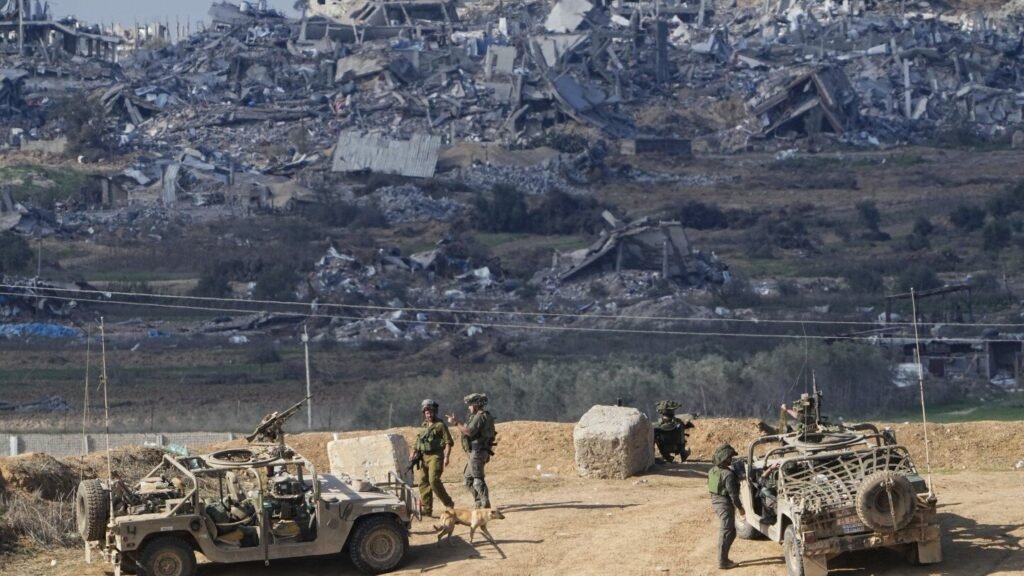JERUSALEM (news agencies) — Sunday marks 100 days that Israel and Hamas have been at war.
The war already is the longest and deadliest between Israel and the Palestinians since Israel’s establishment in 1948, and the fighting shows no signs of ending.
Israel declared war in response to Hamas’ unprecedented cross-border attack on Oct. 7 in which the Islamic militant group killed some 1,200 people, mostly civilians, and took 250 others hostage. It was the deadliest attack in Israel’s history and the deadliest for Jews since the Holocaust.
Israel responded with weeks of intense airstrikes in Gaza before expanding the operation into a ground offensive. It says its goal is to crush Hamas and win the release of the more than 100 hostages still held by the group.
The offensive has wrought unprecedented destruction upon Gaza. But more than three months later, Hamas remains largely intact and hostages remain in captivity. The Israeli military says the war will stretch on throughout 2024.
Here are five takeaways from the first 100 days of a conflict that has upended the region.
The Oct. 7 attack blindsided Israel and shattered the nation’s faith in its leaders.
While the public has rallied behind the military’s war effort, it remains deeply traumatized. The country seems to be reliving Oct. 7 — when families were killed in their homes, partygoers gunned down at a music festival and children and older people abducted on motorcycles — every day.
Posters of the hostages who remain in Hamas captivity line public streets, and people wear T-shirts calling on leaders to “Bring Them Home.”
Israeli news channels devote their broadcasts to round-the-clock coverage of the war. They broadcast nonstop tales of tragedy and heroism from Oct. 7, stories about hostages and their families, tearful funerals of soldiers killed in action and reports from Gaza by correspondents smiling alongside the troops.
There is little discussion or sympathy over the skyrocketing death toll and deteriorating humanitarian situation in Gaza. Plans for postwar Gaza are rarely mentioned.
One thing has remained constant. While chastened Israeli security officials have apologized and signaled that they will resign after the war, Prime Minister Benjamin Netanyahu remains firmly entrenched.
Despite a sharp drop in his public approval ratings, Netanyahu has resisted calls to apologize, step down or investigate his government’s failings. Netanyahu, who has led the country for almost all of the past 15 years, says there will be a time for investigations after the war.
Historian Tom Segev said the war will shake the country for years, and perhaps generations, to come. He said the failures of Oct. 7 and the inability to bring the hostages home have fomented a widespread feeling of betrayal and lack of faith in the government.
“Israelis like their wars to go well. This war doesn’t go so well,” he said. “Lots of people have the feeling that something very, very deep is wrong here.”
Conditions before Oct. 7 were already difficult in Gaza after a stifling blockade imposed by Israel and Egypt following Hamas’ takeover in 2007. Today, the territory is unrecognizable.
Experts say the Israeli bombing is among the most intense in modern history. Gaza health authorities say the death toll already has eclipsed 23,000 people, roughly 1% of the Palestinian territory’s population. Thousands more remain missing or badly wounded. Over 80% of the population has been displaced, and tens of thousands of people are now crammed into sprawling tent camps on small slivers of space in southern Gaza that also come under Israeli fire.
Jamon Van Den Hoek, an Oregon State University mapping expert, and colleague Corey Scher of the City University of New York’s Graduate Center, estimate that roughly half of Gaza’s buildings have likely been damaged or destroyed, based on satellite analysis.
“The scale of likely damage or destruction across Gaza is remarkable,” Van Den Hoek wrote on LinkedIn.
The human cost is equally mind-boggling. The United Nations estimates that about one-quarter of Gaza’s population is starving. Just 15 of Gaza’s 36 hospitals are partially operational, according to the U.N., leaving the medical system close to collapse. Children have missed months of school and have no prospects for returning to their studies.


